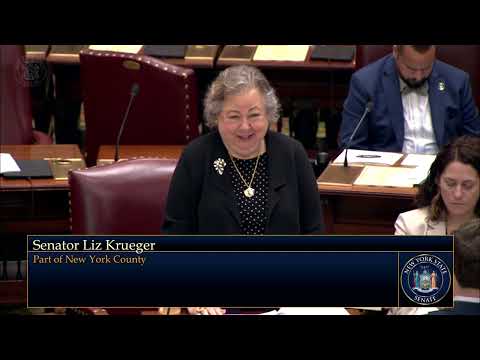
Testimony before the MTA on the Proposed Acquisition of Permanent Easements, Resulting in Tenants and Small Business Displacement, in Connection with Contracts 3, 4, and 5 of the Second Avenue Subway Project on September 20, 2007
Liz Krueger
July 15, 2010
My name is Liz Krueger and I am the State Senator representing New York’s 26th Senate District, which covers Manhattan’s East Side and Midtown. I am here to testify on the proposed acquisition of residential and commercial buildings to construct station entrances and ancilary facilities for the Second Avenue Subway.
The transit authority estimates acquisition will displace residents in 60 apartments and 18 commercial businesses in mixed use pre-war tenement buildings – many of whom have resided and invested in the Yorkville section of Upper East Side for decades. Despite a booming Manhattan residential and commercial real estate market, these buildings have provided relatively affordable rents for small businesses serving the community and rent-regulated apartments to shelter long-term residents from skyrocketing rents. It is essential that the MTA relocate any tenants and small businesses displaced due to construction of the Second Avenue Subway to comparable replacement housing on the East Side. Doing so is the right thing to do not only for individuals residents and businesses, but for the greater good of the Yorkville/Upper East Side community.
In my conversations with the MTA, I have been pleased to hear my views on this matter largely reflected at the authority's top levels. Of course, the devil is in the details and despite moving forward with eminent domain proceedings and preparing detailed analysis of the project's environmental impacts, the MTA has not explained how tenants and small businesses will be relocated. Given the sacrifices expected of these individuals, the MTA must move expeditiously in developing a comprehensive plan to relocate tenants within the East Side.
The formulation of a relocation package above what is required by law is essential given the meager benefits afforded to tenants and businesses under the existing eminent domain statutes. Signed into law by President Nixon in 1970, the Uniform Act governs the acquisition process but provides little protection for residential or commercial tenants and ignores the special circumstances of tenants living in rent-regulated apartments as well as the realities of New York City housing and commercial rental costs. The Uniform Act requires tenants be relocated to a "comparable replacement dwelling," loosely defined as: "decent, safe, and sanitary,"
"functionally equivalent," and "in an area not subject to unreasonable adverse environmental conditions."
If the rent of the new dwelling exceeds rent at their previous dwelling, tenants are entitled to a monthly reimbursement stipend not to exceed $125 over a 42 month period for a total of $5,250. Additionally, tenants are entitled to full moving costs and the opportunity to take the $5,250 payment in the form of a lump sum to be applied as a down payment towards purchasing a new home.
Commercial tenants are entitled to compensation for moving expenses, loss of property and assistance to re-establish their business. Altogether, these costs may be paid in a combination lump sum/ monthly payment structure, but businesses are expected to relocate and reestablish themselves with a maximum of $20,000.
It goes without saying that virtually all rent-regulated tenants and small businesses will be forced to leave the Upper East Side without financial assistance from the MTA. A market overview of the Manhattan real estate market prepared by Prudential Investments found that the entry level market asking price for a one bedroom on Manhattan's East Side cost approximately $2,056 per month in January 2006, while the average entry level two bedroom rented for $2,778, and an entry level 3-bedroom rented for $4,948. A commercial tenant contacting our office estimated they currently pay 66% of market rate for their commercial space and that, given the unusually large amount of commercial space occupied by their business and necessary for its operation, they will be forced to close their business without financial assistance.
Issues relating to the practice of eminent domain continue to present dilemmas for government. Over the years, regulations have been developed to provide for due process for those losing property and payment guidelines have been established to ensure fair compensation for property owners. The 2004 Supreme Court ruling in Kelo Vs. the City of New London prompted a number of legislative reforms to define what is and what is not an appropriate use of eminent domain.
Despite these reforms, the law provides little protection for displaced renters seeking to live or do business in their neighborhood. I applaud the MTA’s recognition of these deficiencies, and urge them to follow through on promises to relocate those displaced by the Second Avenue Subway to comparable locations on the Upper East Side.
Thank you for the opportunity to testify.
Share this Article or Press Release
Newsroom
Go to NewsroomTREES Act Passes Both Houses Of The Legislature
May 16, 2024



